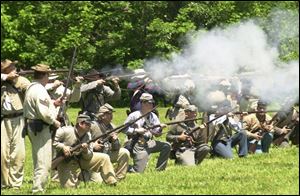
Time retreats as history buffs muster on Maumee
6/17/2001
Confederate troops at Fort Meigs? These re-enactors join forces with Doughboys of World War I, GIs of World War II, soldiers of Rome, and Desert Storm fighters on the field of living history.
Four score and seven years ago, nobody could stroll the wide expanse of Fort Meigs State Memorial Park in Perrysburg and be surrounded by likenesses of Abraham Lincoln and Mark Twain, as well as soldiers from the Roman Empire, the Revolutionary War, the Civil War, World Wars I and II, the Vietnam War, and even the Persian Gulf War.
Times have changed.
The eighth annual Muster on the Maumee, which concludes today, is a smorgasbord of a history festival. One moment, spectators can watch war re-enactments by actors and would-be actors. The next, they can inspect items ranging from medieval crossbows used during the Renaissance era to gas masks and camouflage helmets worn during the Operation Desert Storm campaign.
Called one of the most diverse events of its kind, the re-enactment certainly ranks among the most surreal. It could very well be one of the only places visitors can grab lunch at a concession called the Hippie Chick Love Caf and catch a glimpse of its rainbow-colored peace sign, then take a path across a bunker to see Vietnam War-era weapons.
Yes, the times, they have changed.
Ralph E. Borror of Holland speaks candidly about Muster on the Maumee, as he should - given that he has portrayed former President “Honest Abe” Lincoln hundreds of times at area festivals, fairs, re-enactments, and school functions for 13 years. He said he spent nine years studying the part before he started performing it.
Mr. Borror, who delivered Mr. Lincoln's famous Gettysburg Address yesterday at the base of the park monument, said the role fascinates him more as he gains experience reading audiences.
Like many re-enactors, Mr. Borror seems driven by a love of history and a string of odd coincidences re-enactors perceive as fate. He noted that he bought a house on Lincoln Green Road in 1963, hardly knowing he would moonlight as Mr. Lincoln some 15 years later. His primary job is that of a bus driver for Springfield Local Schools. Springfield is the Illinois capital where Lincoln had once been a statesman and lawyer.
Then there's Brian Dewey, of Gregory, Mich., who grew up a big fan of cowboy movies and two long-running television Westerns, Gunsmoke and Bonanza. After gaining access to an 1880s replica chuck wagon via a friend, the inevitable happened: Mr. Dewey, a building contractor, immersed himself in the history of Montana cowboys and has portrayed one for about five years.
For Ashley Lane, 19, of Perrysburg, the chance to be a re-enactor became appealing as a chance to broaden her education. She is an interior design major at Bowling Green State University, and is participating in the Perrysburg festival her third time, dressed this year and last as a Civil War-era civilian. “You read about [history] in books, but you really don't know what it's like until you put on the clothes,” she said.
John Molitoris, 16, who will enter his junior year at Maumee High School this fall, said his fascination with the Civil War prompted him to begin touring as a re-enactor last summer. “A lot of kids don't understand why I do it. They think I'm nuts,” he said.
Some came from miles away. Wayne Milton, who has 14 characters in his repertoire and appeared with actor Mel Gibson as an extra in The Patriot, came from Erlanger, Ky., where he is assistant manager of a 91-acre horse farm. He was dressed as a Shawnee Indian, with details down to the silver jewelry in his nose.
He said he looks forward to evenings, after the public has left. Re-enactors who camp at the site continue to take extra care in respecting their historical era.
“No one will pull out a flashlight. It will be all lanterns and candles,” Donlyn Meyers, a co-founder, said. A self-described former “hippie craftsman,” she went from making pottery to establishing a Waterville business called Smoke & Fire, which employs 27 people and sells reproductions of historical clothing and equipment.